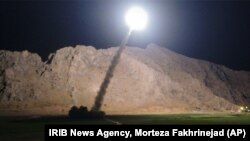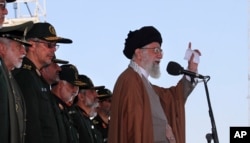Iran's Supreme Leader Ayatollah Ali Khamenei ordered weekend missile strikes on Islamic State targets in Syria, Revolutionary Guards said, contradicting a previous report that they were authorized by the country's security council.
The Guards fired six mid-range surface to surface missiles from western Iran into Syria's Deir al Zour province on Sunday night, the first attack of its kind carried out by the Islamic Republic in years.
The Guards statement, published on Wednesday by Sepah News, ran counter to a statement by President Hassan Rouhani who said earlier that the strikes were authorized by the Supreme National Security Council, which includes the heads of the three branches of government as well as the head of the Guards and other ministers.
Senior Guard commanders said on Monday that the missile strikes were intended to send a message to “terrorists” who carried out attacks in Tehran two weeks ago as well as their regional and international supporters, a reference to Saudi Arabia and the United States.
Saudi Arabia blamed for attacks
Khamenei's personal directive for the missile strikes, as reported by the Guards, highlighted their symbolic importance.
The complex attacks in Tehran included shootings and at least one suicide bombing at the Iranian parliament and the mausoleum of Ayatollah Ruhollah Khomeini, the founder of the Islamic Republic, south of the capital. Eighteen people were killed.
Islamic State claimed responsibility for these attacks but senior Iranian officials pointed a finger at Saudi Arabia, the Islamic Republic's biggest regional rival.
Tensions increase
Tensions between mostly Shi'ite Iran and Saudi Arabia, which is predominantly Sunni, have ramped up in recent months as both countries compete for power and influence across the region. The two countries support opposite sides in the conflicts in Syria and Yemen.
Field operatives from the Quds Force, the branch of the Guards responsible for operations outside Iran's borders, gathered intelligence on the targets inside Syria before the strike, the Guards' statement said.
More than 170 “terrorists” including some commanders were killed in the missile strike, their statement said. Reuters could not independently verify the claim.






